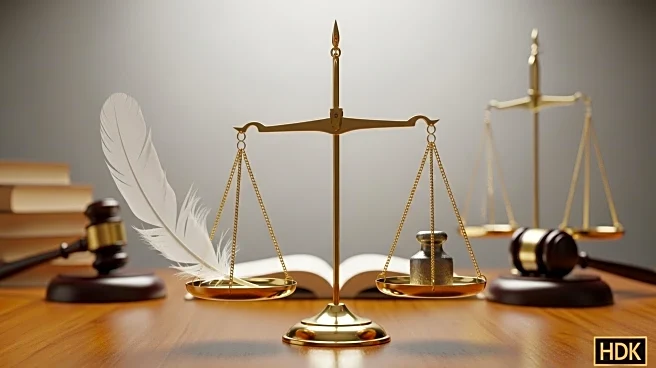What's Happening?
A recent op-ed in the Los Angeles Times has sparked discussion on the fairness and effectiveness of the bail system in the United States. The piece argues that the current bail system disproportionately affects the poor, people of color, and those accused of nonviolent crimes. Many individuals, despite being innocent, are unable to afford bail, leading to severe personal consequences such as job loss, damaged reputations, and family issues. The op-ed also highlights the disparity in how crimes committed by wealthier individuals are often minimized, citing the example of Jeffrey Epstein. The letter to the editor emphasizes that the bail system does not enhance public safety and instead contributes to a cycle of crime and financial burden on taxpayers.
Why It's Important?
The debate over the bail system is significant as it touches on broader issues of social justice and economic inequality. Critics argue that the system perpetuates a cycle of poverty and incarceration, disproportionately affecting marginalized communities. The financial burden on taxpayers to maintain this system is also a point of contention. Reforming the bail system could lead to more equitable treatment of individuals within the justice system and potentially reduce the overall crime rate by addressing the root causes of criminal behavior rather than punishing poverty. The discussion is part of a larger national conversation about criminal justice reform and the need for policies that ensure fairness and safety for all citizens.
What's Next?
As the debate continues, policymakers and advocacy groups may push for legislative changes to reform or eliminate the cash bail system. Potential reforms could include implementing risk assessment tools to determine the necessity of bail on a case-by-case basis, thereby reducing the reliance on cash bail. Stakeholders such as civil rights organizations, legal experts, and community leaders are likely to play a significant role in shaping the future of bail reform. The outcome of this debate could have lasting implications for the U.S. justice system and its approach to pretrial detention.
Beyond the Headlines
The discussion around bail reform also raises ethical questions about the role of money in the justice system. The current system's reliance on financial capability to determine pretrial freedom highlights a fundamental inequity that challenges the principle of equal justice under the law. Long-term shifts could include a reevaluation of how justice is administered and a move towards more restorative approaches that focus on rehabilitation rather than punishment.









